[Guide] What Is the Best Time and Day to Publish a Blog Post?
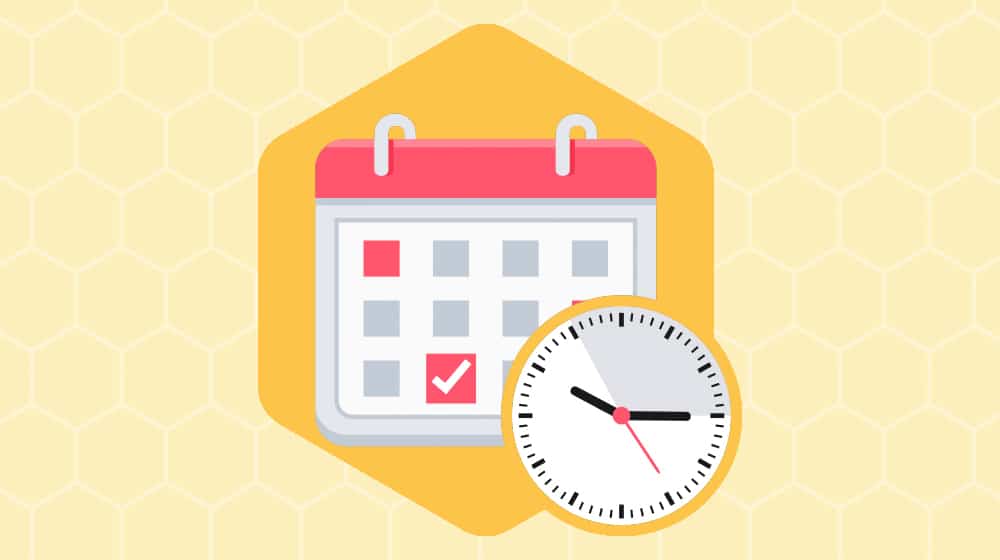
This question has a lot of controversial answers out there in the wild. What's worse, there have been a lot of studies done over the years, and not only is the information often contradictory, it can be pretty old; the best time and day to publish a blog post this year might not be the same as it was last year, or five years ago or next year.
I get this question from my clients occasionally, too:
"When is the best time to schedule my articles in WordPress?"
I will give you a good idea of what you should consider with your post timing and the factors that could influence your publishing schedule.
Let's dig in, shall we?
There's No Such Thing as the "Best" Time to Publish a Blog Post
Alright, let's start with the elephant in the room. Actually, there are two.
1. The first is that your publication time and date makes zero difference when it comes to search engine traffic and traditional evergreen blog content. You can post articles at 2 AM or noon, Thursday or Tuesday - it won't affect the long-term success of your article either way.
2. The second is that, contrary to what you might read on other tutorials and step-by-step guides, there's no such thing as a general "best time of the week" to publish any other types of content on your blog, either.
Those are two very important qualifiers.
The first is "your," which means that the best time for me to publish my blog posts is not going to be the best time for you to publish yours. It comes down to a lot of different factors.
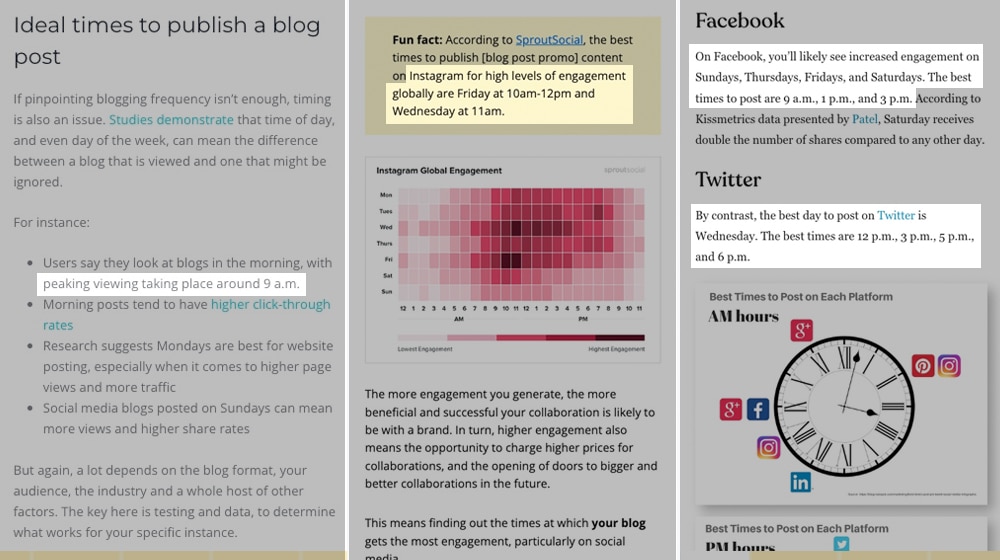
For example:
- Purpose. The most common reason for caring about the time a blog post is published is that the article is intended to be shared on social media, email marketing newsletters, or if it's time-sensitive. The time of day on social media matters since there are definitive hours that users are more active on social media. If you're publishing evergreen content and primarily pursuing search traffic, it doesn't matter when you post your content - it will take some time to start ranking and pulling in traffic at all hours of every day. If you're posting a short article on social media, time is much more critical. If you create your social media posts at midnight or the early morning, most people are sleeping, and it will be buried under thousands of new posts when people wake up.
- Geography. If I tell you to publish your posts during lunch, when is that? What time zone are you talking in? Noon on the east coast (EST) is different from noon on the west coast (PST), noon in Hawaii, and noon in Australia. On the one hand, no single time will be the best; on the other, it means you have more than one "best" opportunity to share and promote your content.
- Type of Content. A blog post full of breakfast recipes probably should be published before breakfast, or even the night before, so people looking for breakfast options already have it available. A blog post with fitness advice could be published later in the day when people are getting out of work and heading to the gym. A blog post about content marketing strategy can be published any day of the week, and a blog post with affiliate links would do best on a Friday when everyone is getting paid.
- Seasonality. You might perform a research study and find that your blog posts pull in the most traffic on Wednesdays, but if you're trying to capitalize on a holiday that falls on a Monday, you probably shouldn't wait until two days late to publish.
In short, it's all very contextual.
The second qualifier is "better" in that there's no such thing as a singular best time. There are better and worse times, but much of it comes down to common sense.
What do I mean? Well, if you're publishing your content at 4 AM, how many people are even up to reading it? By the time your audience wakes up, hundreds or thousands of other blogs will have published content on social media after yours.
You want to know when during the day and during the week your target audience will be reading content online, and then work to publish your content before that time. How long "a little bit" depends on competition, venues, activity levels, and factors like whether or not you're paying for promotion.
I emphasized the target audience because the most popular times to post something are often looking at raw numbers. Social media usage surges when most people end their workday at 5:00 PM; this is great if you're selling B2C products, but posting during business hours and during the weekdays might be a better move if you're trying to target small businesses. Traffic volume isn't everything.
Speaking of audience:
Muddled by Algorithms
Consider where you get your information these days. It's probably things like:
- Links you see shared on Facebook.
- Links you see shared on Twitter.
- Links you see shared on LinkedIn.
- Google's Discover feed on your phone browser homepage.
- Organic Google search results, and other search engine algorithms.
- The front page of Reddit.
- Links from friends on Discord, Slack, or your other messenger of choice.
How many of these are chronological? Basically, none of them.
- Facebook links are shuffled around by a frankly oppressive algorithm.
- Twitter does everything it can to prevent you from seeing your feed in chronological order and changes every so often to make it harder to revert, and they hope that you don't notice.
- Google's Discovery feed can have content from weeks or months ago based on trends and your recent interests.
- Organic search results, as you likely know, tend to be older, with only 22% of the top ten results on average under a year old.
- Of course, Reddit is based on whatever is getting the most engagement, whether or not that's actually the most recent content.
The most likely to be chronological are messages from friends, and even that only happens if you have friends who like to have the most up-to-date links to share with you.
Others don't care and will share anything they think you might like, which could be days, weeks, or months old.
Most of your audience is filtered through at least one algorithm, and often more than one. Sometimes your visitors will if they check your site directly, browse using RSS, or have some other way to keep track of your content when it drops.
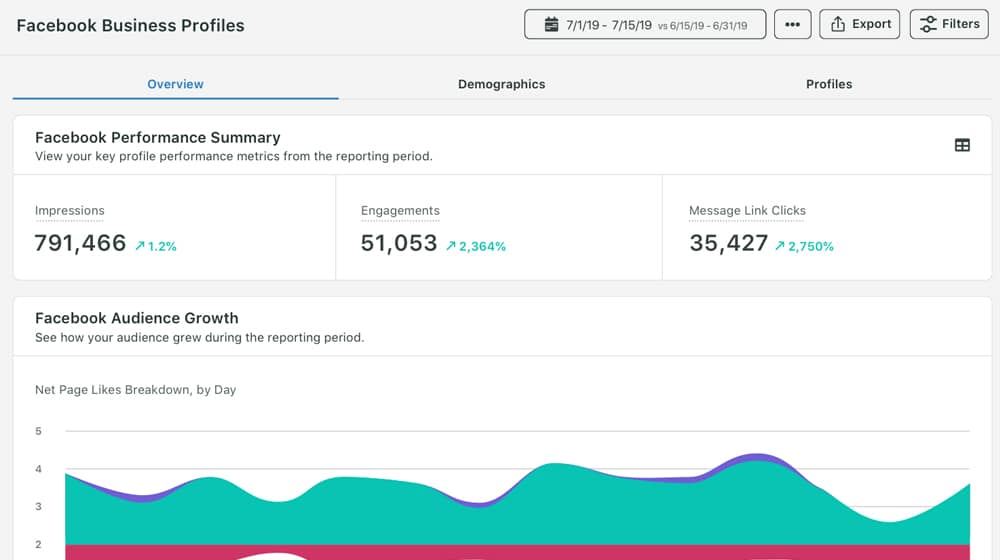
The exception to this is when you're paying for ads to put your content in front of your audience.
Paying tends to cut past the algorithms to give you more guaranteed exposure (and, indeed, isn't that part of why the algorithms exist; to get you to pay to bypass them?), but, of course, you need to pay for any content you want to be shown. Most bloggers aren't paying to promote every post they publish.
Timing is Goal Dependent
Another detail that muddies the waters here is that the timing can vary based on your goals.
What is your blog post trying to accomplish? Are you looking to get social shares, want people to click through to other content on your site, or are you hoping for affiliate link purchases or sales from your store?
Social sharing is easy, so the timing is more flexible. All you need is to get your content in front of someone who might think their friends should see it, and all they need to do is click a button.
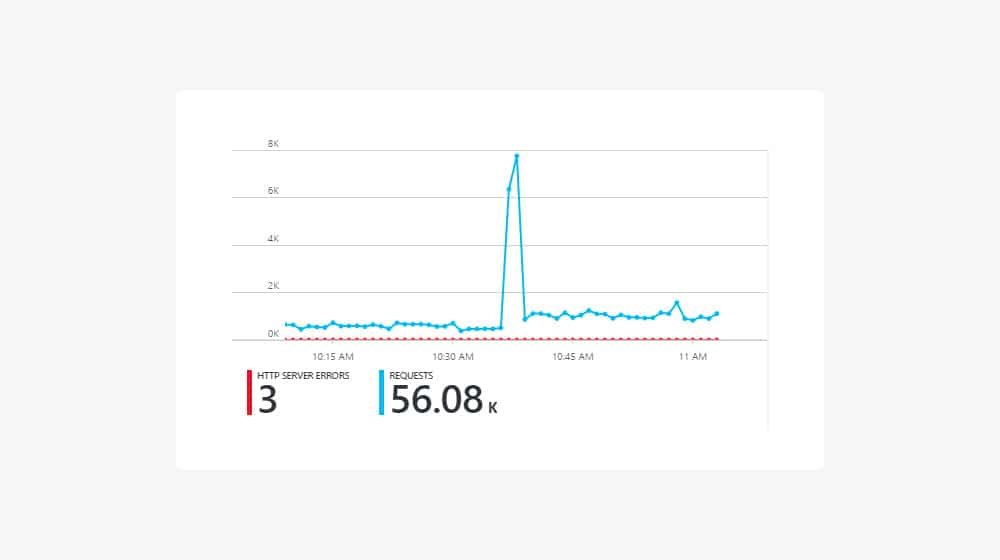
Making a purchase is more challenging, so your post will need to be scheduled for a time when your users are likely to be actively shopping with the intent to purchase.
Getting people to click around and read posts can be a significant time investment, so you need to compete with other attractive content or deadlines like the end of a lunch break.
Your goals impact when you should be publishing your posts.
You're Not Limited to One Time
You can only publish a piece of content once; that's true.
But, again, look at the various ways you find content. Chances are it's not going to be through the sites directly; it's going to be through an intermediary platform. That means you can take advantage of timing by posting your content to those sites more than once.
I remember an old study from 2015 where Hootsuite took one link, tweeted the same link/story on Twitter 44 different times at varying times each day, and monitored how many times they could share it before engagement dropped off.
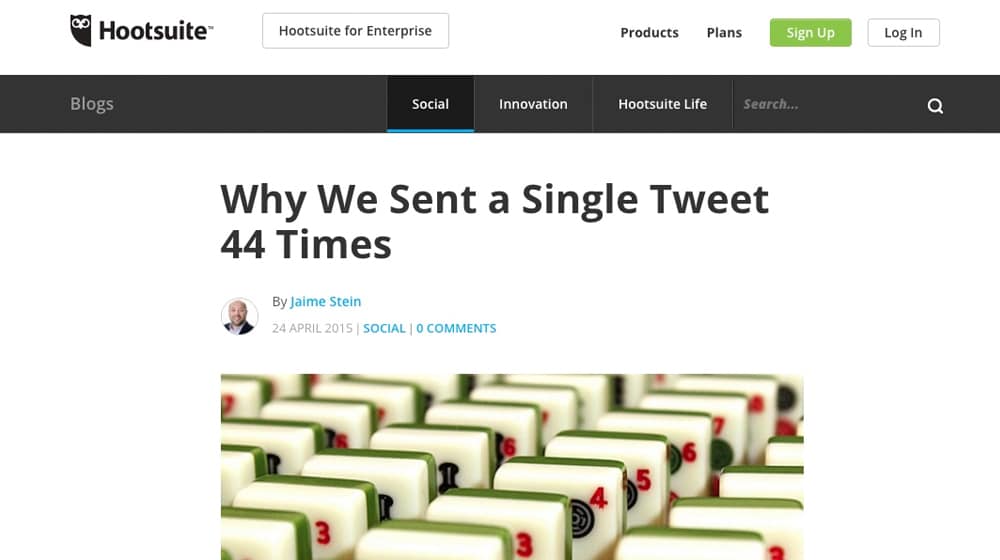
The results were basically, "unless you get flagged for spam, it doesn't matter. Keep posting; you reach a new audience segment every time."
They've since removed the study from their site, but you can read an old copy on Archive.org:
Now, algorithms for social network sites like Facebook change a lot from year to year, and this experiment took place way back in 2015. Still, if anything, social media platforms have only gotten friendlier to reposting over the years because organic reach has declined with every passing year.
You may have a national audience or know that people like to read blogs on their lunch break. So, you publish your post just before lunch on the east coast.
Then, you publish it again just before lunch in the central time zone and once more just before lunch in mountain time. Then, you post it again just before lunch on the west coast.
You don't have one "best days" or "best times to post"; you have four, at least. If you have a national audience, you may have a global audience, which means you have even more opportunities. It all depends on where your audience is clustered.
It Doesn't Really Matter
The dirty secret of timing is that the specific timing doesn't matter as much as thousands of other factors.
What's much more important is consistency; this is the point I bring up in my blog post frequency analysis post, too.
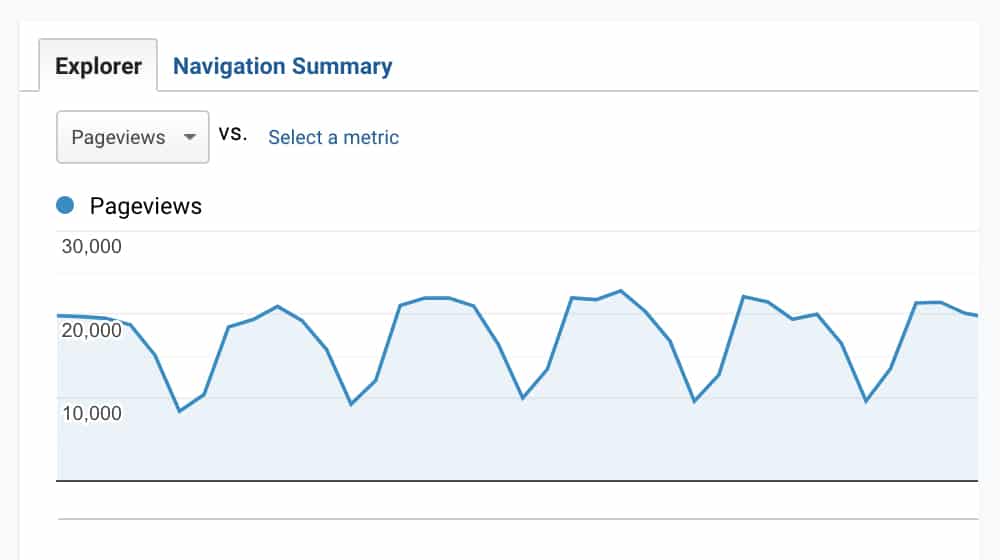
If you have a site that brings in 1,000 visitors a day, and you get a 0.8% bump in traffic posting at noon instead of 5 PM, great! That's eight visitors showing up who wouldn't have otherwise.
- How much time and energy did you spend figuring out how to reach those eight people?
- How many other sources of value could you have gotten from that time and energy?
- Could you have done more keyword optimization to reach a wider audience?
- Could you have written an additional section to make your content more sharable and more likely to go viral?
- Could you have spent more time responding to comments to build engagement instead?
- Could you have done more research for your next piece of content to make it even better?
- Could you have invested that time in technical improvements to boost your site speed and, thus, your Google rank?
Many brands that tell you how and why to find the best timing for your new blog posts use percentages rather than raw numbers. It sounds impressive that your change in timing got you a 300% increase in traffic, but if that's from 1 visitor to 4 visitors, it's not all that meaningful.
If you post a new blog article during lunch, post it around that time every time you post. If you post at 5 PM, continue to do so at 5 PM. You want people to know when to check to see new content, and more importantly, you want search bots and crawlers to understand when they can expect new blog content from you.
Aside from that, blog post timing doesn't matter. These are web pages; they'll stay around and attract visitors for as long as you keep them alive and maintain them.
I Still Want to Know, Though
I get it. I do!
I don't think picking the ideal time will always be relevant, especially with evergreen content. But data fuels good decisions! It changes with cultural and audience trends, so it might not be long-term relevant information, but it's still data. It's still helpful information, and every little optimization can build upon all the others you do.
How can you check the best time, day, and other timing-based data points for your audience?
It all comes down to using the right analytics.
Google Analytics can do it, even; all you need to do is set up custom dimensions tracking pageviews, engagement, and other metrics by the hour. You can use that to create graphs showing the best time and day of the week for your various metrics. You can quickly learn what time you have the most eyeballs on your website.
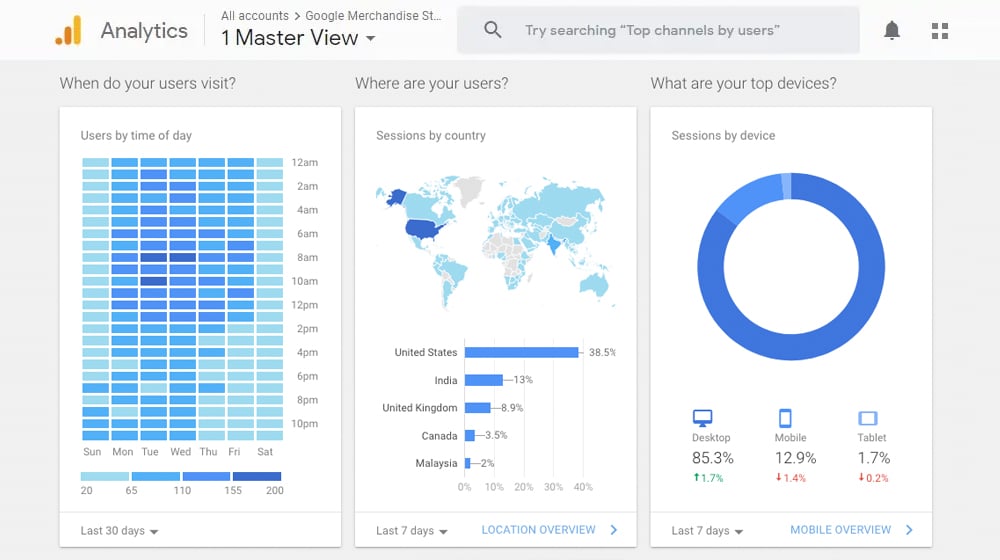
You can also use your social media analytics. Facebook Insights will tell you what your peak times are for engagement. Twitter's Tweet Analytics will show you similar information.
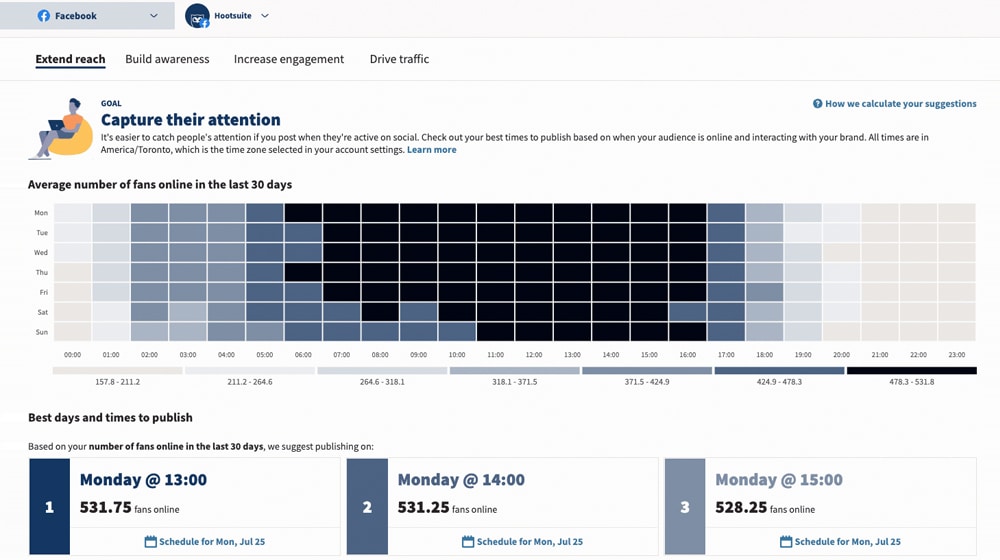
What next?
- You have to harvest that data on an ongoing basis for various pieces of content to ensure it's not just different topics trending at different times.
- Then, you have to test articles at different times to see whether or not it's a bias based on the time you've been posting. After all, if you consistently post at noon, you'll have the best traffic shortly after it. Right?
- Harvest data, and analyze that data. Remove confounding variables, and run your own tests again. Run split tests with different segments of your audience. Harvest data for other platforms where you share your content. Analyze it all, and you'll uncover trends you can use to gather that sweet few extra visitors and compound from there.
Is it the best use of time?
But if you are posting time-sensitive content, it's at least mostly passive once you have those times figured out, and it's relatively easy to change your publishing times and test new dates.
Truthfully, though, you should instead look at where most of your metrics are coming from, and replicate the conditions that brought you those metrics.
Your best-performing content was likely successful for a different reason than the time that you happened to publish it. You put more effort into it than anybody else, found a topic with little competition, or picked up valuable links and an SEO boost from big sites that enjoyed your article.
There are many important metrics in blogging and competitive research, and publishing time isn't usually one of them.
Have you noticed a significant improvement in your blog traffic after publishing at a specific time or day? Is your content evergreen, and do you promote it on social media? Please share with us in the comments below! It would be great to start a conversation with other bloggers to learn what works best for various industries and content types.



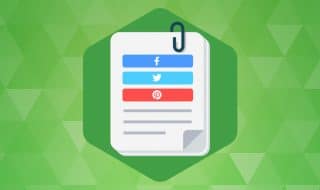
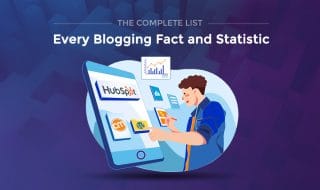





Comments